8 Dynamic AI Notes Apps for Various Scenarios
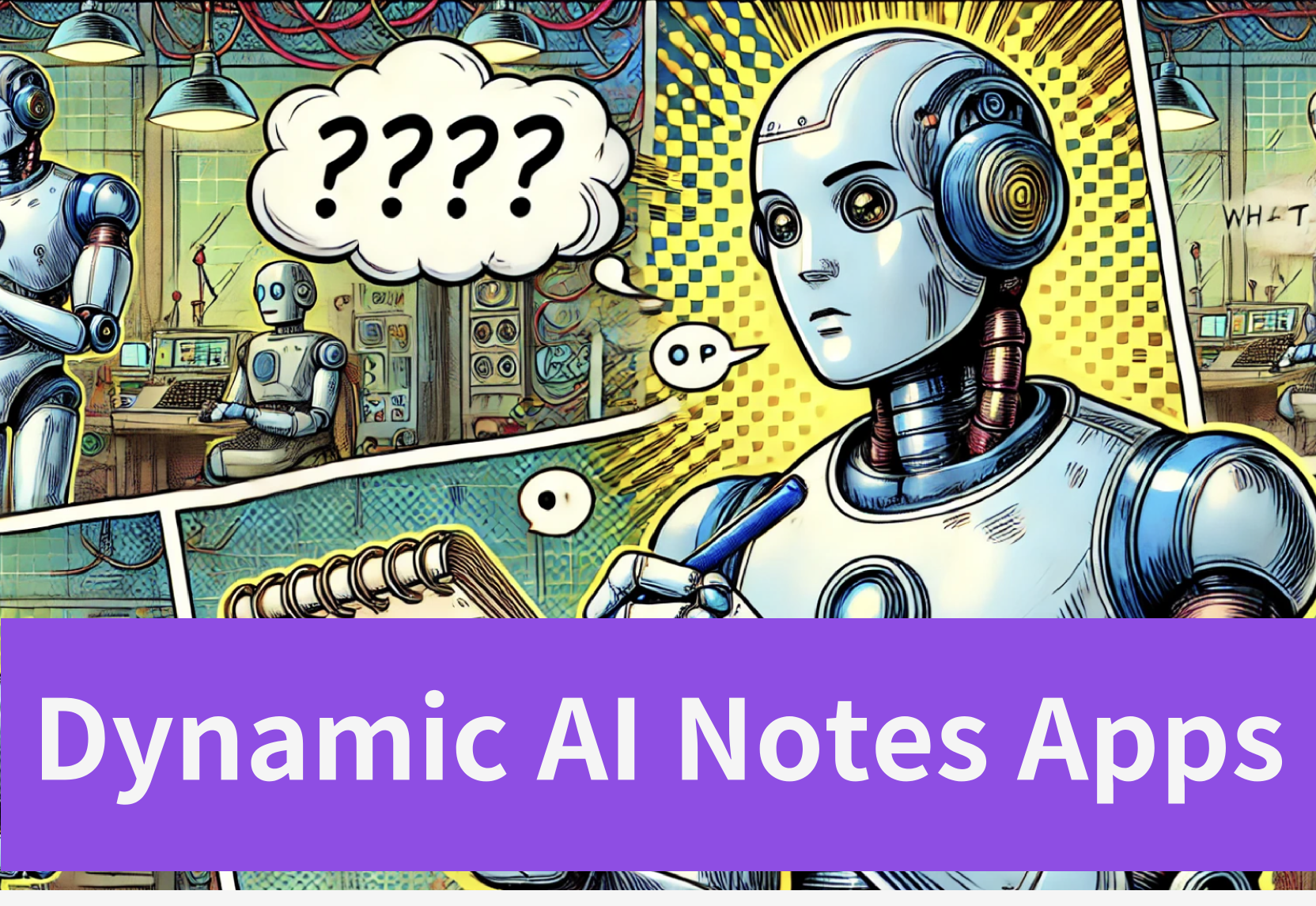
Key Highlights
- Introduction to Dynamic AI Notes Apps: Dynamic AI note-taking apps enhance the note-taking process through AI-driven personalization, contextual understanding, and seamless integration with other tools.
- Market Overview: The note-taking app market is projected to grow from USD 547.66 million in 2022 to USD 994.96 million by 2031, driven by increased demand for efficient digital tools.
- Real-World Applications: These apps offer practical solutions for students, professionals, researchers, and creatives, facilitating study aids, meeting management, literature reviews, and idea development.
- Benefits of Using Dynamic AI Notes Apps: Key benefits include enhanced accuracy, time efficiency, improved organization, contextual understanding, personalization, collaboration, data-driven decision-making, and reduced cognitive load.
- Popular Dynamic AI Note-Taking Apps: Leading apps like Fireflies.ai, Tactiq, Leexi, Jeda.ai, Ideamap, Mem, ClickUp, and Evernote cater to various note-taking needs from meetings to personal organization.
- Factors to Consider When Building a Dynamic AI Note-Taking App: Developers should focus on the app’s purpose, integration of LLM APIs, real-time processing needs, efficient data management, collaboration features, user interface design, security, AI capabilities, tool integration, and ethical considerations.
- Future Trends of Dynamic AI Note-Taking Apps: Emerging trends include advanced AI and ML capabilities, greater personalization, enhanced collaboration tools, cross-platform synchronization, improved security, deeper integration with productivity tools, voice command adoption, handwriting recognition advancements, and increased accessibility features.
Introduction
In the rapidly evolving tech landscape, dynamic AI note-taking apps are at the forefront of innovation. These apps harness the capabilities of artificial intelligence to enhance the note-taking experience by providing personalized suggestions, context-aware categorizations, and seamless integration with other platforms.
For developers, understanding the market potential and the technical requirements for building such apps is crucial. This blog delves into the growing market of dynamic AI notes apps, explores their real-world applications, and outlines the key factors to consider when developing your own AI-powered note-taking solution.
What Are Dynamic AI Notes Apps?
Dynamic AI note-taking apps are a category of software that leverage artificial intelligence to enhance the note-taking process. By utilizing the power of AI, these apps can personalize the note-taking experience, offering tailored suggestions, categorizations, and summaries. Additionally, dynamic AI note-taking apps understand the context of notes, connecting different pieces of information and providing relevant suggestions or insights. They can handle multiple tasks within the note-taking process and scale according to the user’s needs. Moreover, these apps integrate seamlessly with other tools and platforms, learning from the data and workflows of those systems to provide a more cohesive user experience.
How Big Is the Market of Dynamic AI Notes Apps?
Dynamic AI notes app market belongs to the note-taking app market. Overall, according to Global Growth Insight, the Note Taking App Market is experiencing significant growth, with a projected increase in value from USD 547.66 million in 2022 to USD 994.96 million by 2031, reflecting a compound annual growth rate (CAGR) of 22.02%.
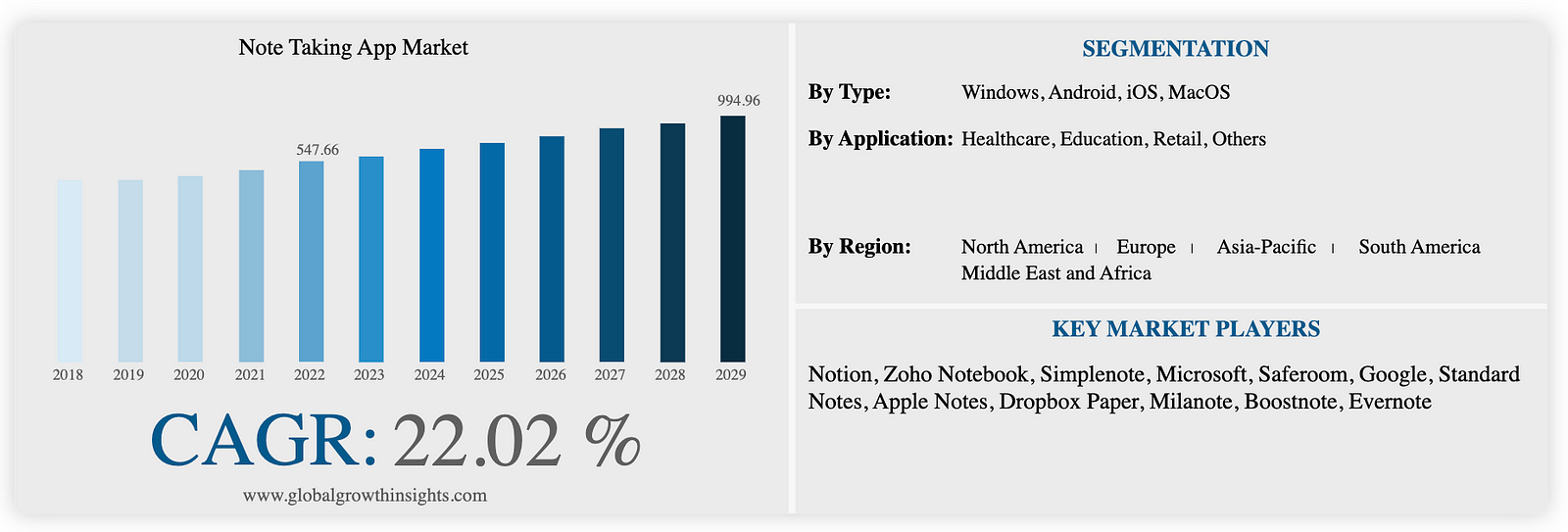
The COVID-19 pandemic accelerated the adoption of note-taking apps, as remote work and online learning necessitated efficient digital tools for information management. Post-pandemic, the market has shown resilience, with trends like remote work and online learning becoming integral to daily routines, prompting app providers to enhance features such as real-time collaboration and security.
Key trends shaping the market include AI and ML integration for intelligent insights, cross-platform compatibility, handwriting recognition, and a focus on security and privacy. Despite challenges such as market saturation and security concerns, opportunities abound in specialized apps for niche markets and the corporate sector.
What Are the Real-World Applications of Dynamic AI Notes Apps?
Students
- Study Aids: Dynamic AI can help students by summarizing lectures, identifying key concepts, and creating flashcards for revision.
- Research Assistance: Automatically organizing and categorizing research materials, providing insights, and generating bibliographies.
- Collaborative Learning: Facilitating group study sessions by taking collaborative notes and sharing them in real-time.
Professionals (Business and Office Workers)
- Meeting Management: Transcribing and summarizing meetings, identifying action items, and assigning tasks to team members.
- Project Documentation: Organizing project-related notes, creating reports, and maintaining a knowledge base for team reference.
- Time Management: Prioritizing tasks based on note content and suggesting the most efficient use of time.
Researchers and Academics
- Literature Review: Summarizing and synthesizing large volumes of research articles and papers.
- Data Analysis: Assisting in the interpretation of data, suggesting patterns, and generating hypotheses.
- Writing Assistance: Drafting papers, creating outlines, and proofreading for grammar and style.
Creative Professionals (Writers, Designers, etc.)
- Idea Development: Expanding on initial ideas, suggesting creative directions, and brainstorming concepts.
- Content Creation: Generating drafts, outlines, and even full pieces of content based on the notes and ideas.
- Resource Management: Organizing inspiration, sketches, and references in a way that supports the creative process.
What Are the Benefits of Using Dynamic AI Notes APPs?
1. Enhanced Accuracy and Completeness
AI note-takers capture every detail of the discussion without missing any nuances, ensuring that all important points, decisions, and action items are documented accurately.
2. Time Efficiency
AI tools save significant time by automatically transcribing and summarizing notes in real-time, allowing teams to quickly move from discussion to action without the need for manual note processing.
3. Improved Organization and Accessibility
AI note-takers store and organize notes in a structured and searchable manner, creating an easily navigable knowledge base that enhances information retrieval.
4. Contextual Understanding
AI tools can understand the context of discussions, recognize different voices, and adapt to technical jargon, providing a more meaningful and relevant summary of the information.
5. Personalization and Adaptability
AI note-takers can adapt to individual user preferences and learning styles, offering a personalized note-taking experience that evolves over time.
6. Collaboration and Sharing
AI tools facilitate collaboration by allowing real-time note sharing and editing among team members, promoting collective knowledge and teamwork.
7. Data-Driven Decision Making
By providing comprehensive and well-organized notes, AI note-takers support data-driven decision making, ensuring that teams have access to accurate and up-to-date information.
8. Reduced Cognitive Load
AI note-takers free up cognitive resources by automating the note-taking process, allowing individuals to focus more on the content of the discussion rather than the act of note-taking.
What Are Popular Dynamic AI Notes Apps?
For Meeting Note-taking
1 Fireflies.ai
Fireflies.ai helps your team transcribe, summarize, search, and analyze voice conversations. It can get automatic meeting notes, action items, and transcripts. Moreover, it can find anything with AI-Powered Search. It also supports collaboration with co-workers.
The pricing plans are as follows:
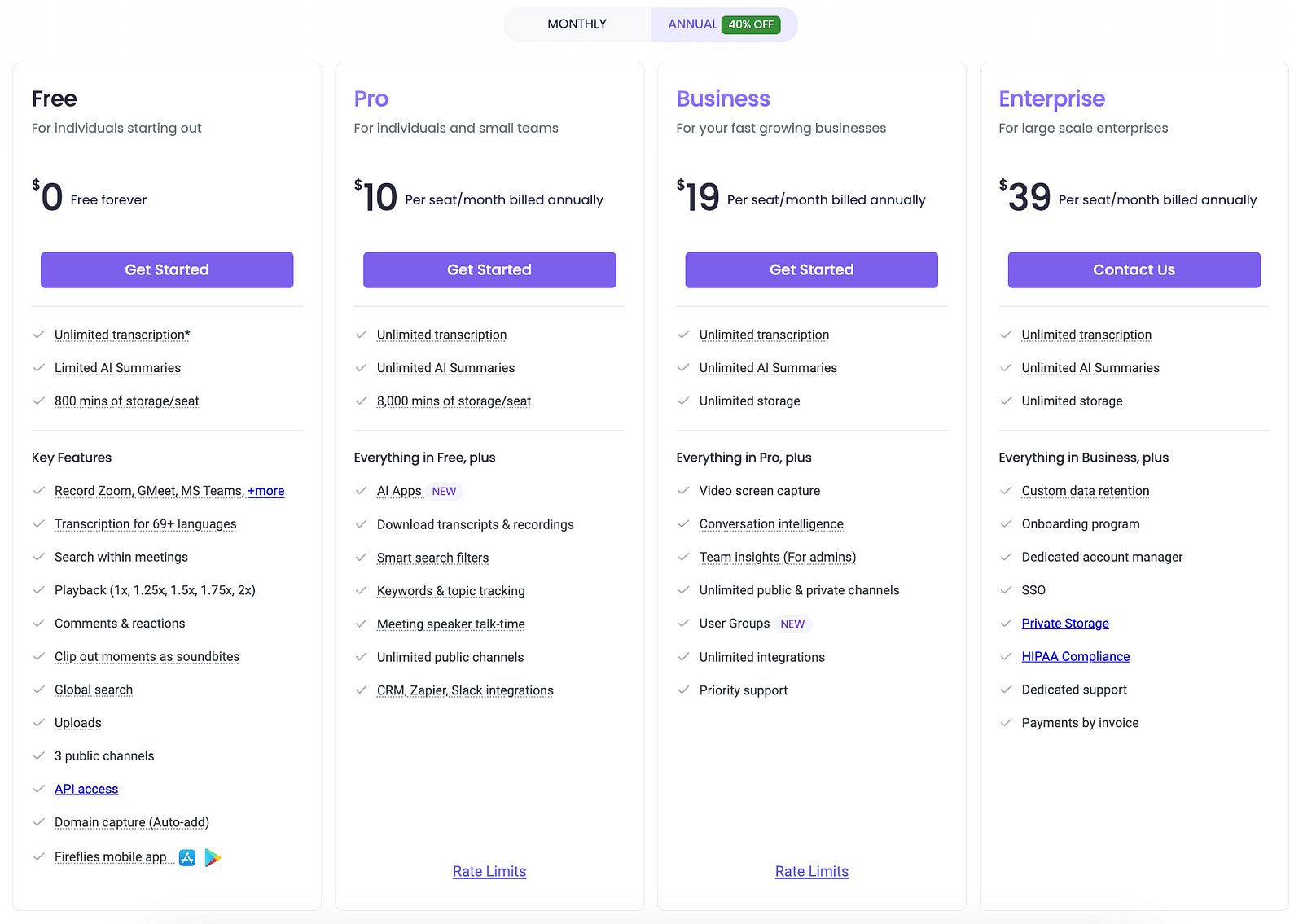
2 Tactiq
Tactiq’s AI Note Taker seamlessly turns your meetings into actionable notes with real-time transcriptions. It works with Google Meet, Zoom and Microsoft Teams.
The pricing plans are as follows:
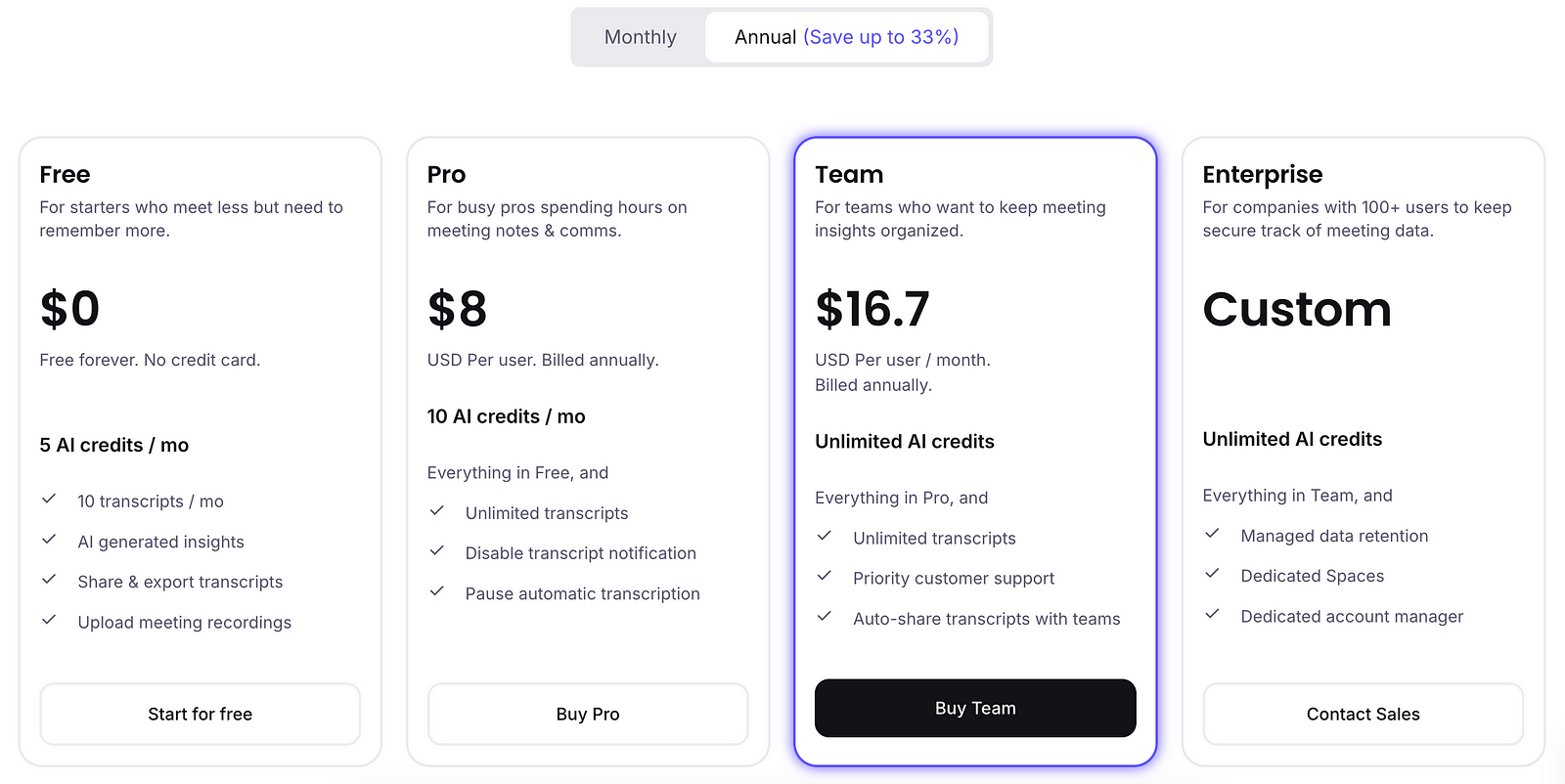
3 Leexi
Leexi uses generative AI to transcribe, analyze, summarize your meetings, and automatically propose next steps. AI meeting saves you time on all these time-consuming tasks.
The pricing plans are as follows:
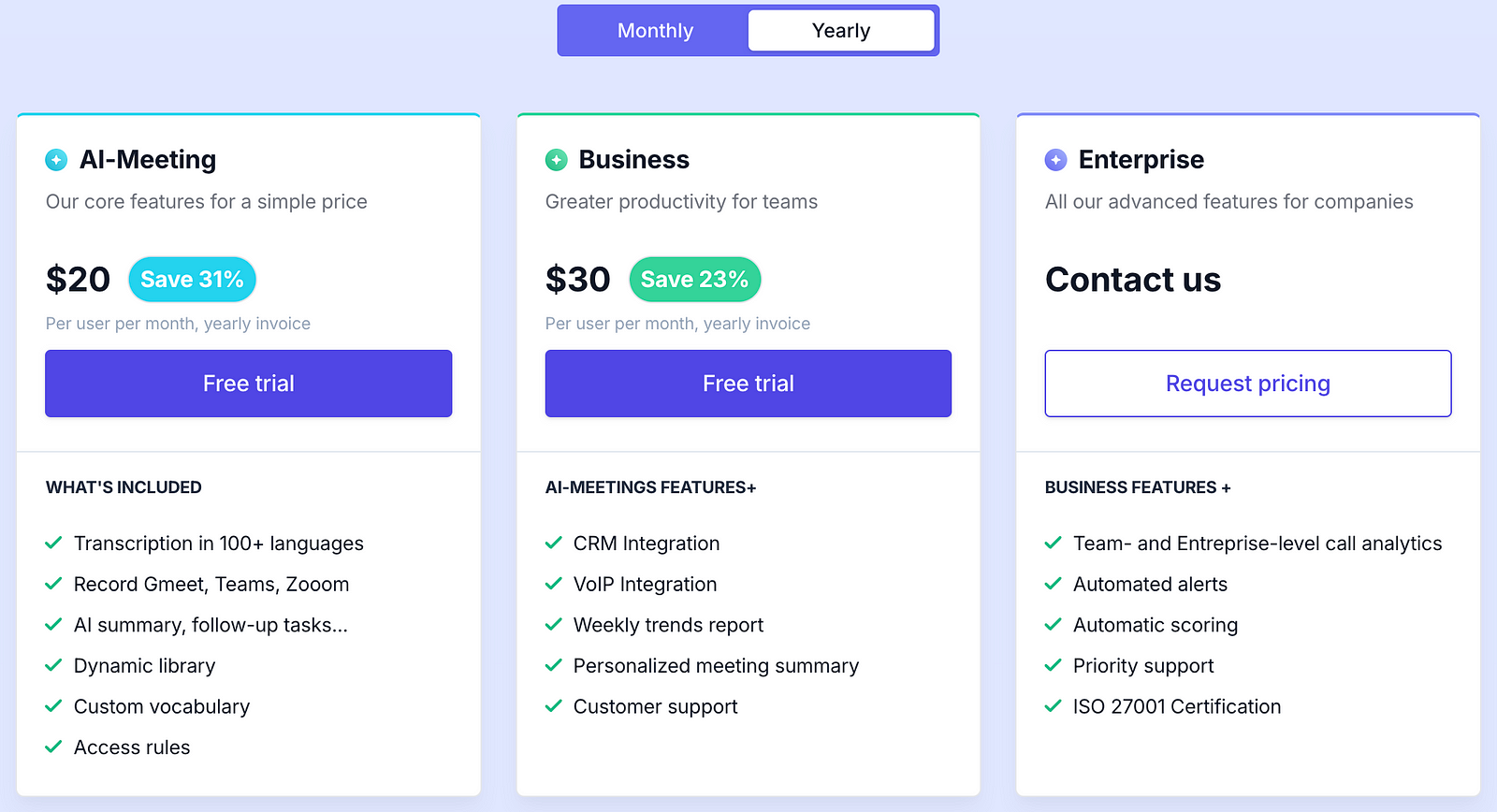
For Brainstorming Notes
1 Jeda.ai
Jeda.ai is redefining brainstorming and collaboration with Generative AI Sticky Notes. Unleash your productivity, and make decisions based on data-driven insights. With Jeda.ai’s AI Sticky Notes, you have the capacity not only to generate notes but also customize and collaborate on them, ultimately enhancing your workspace.
The pricing plans are as follows:
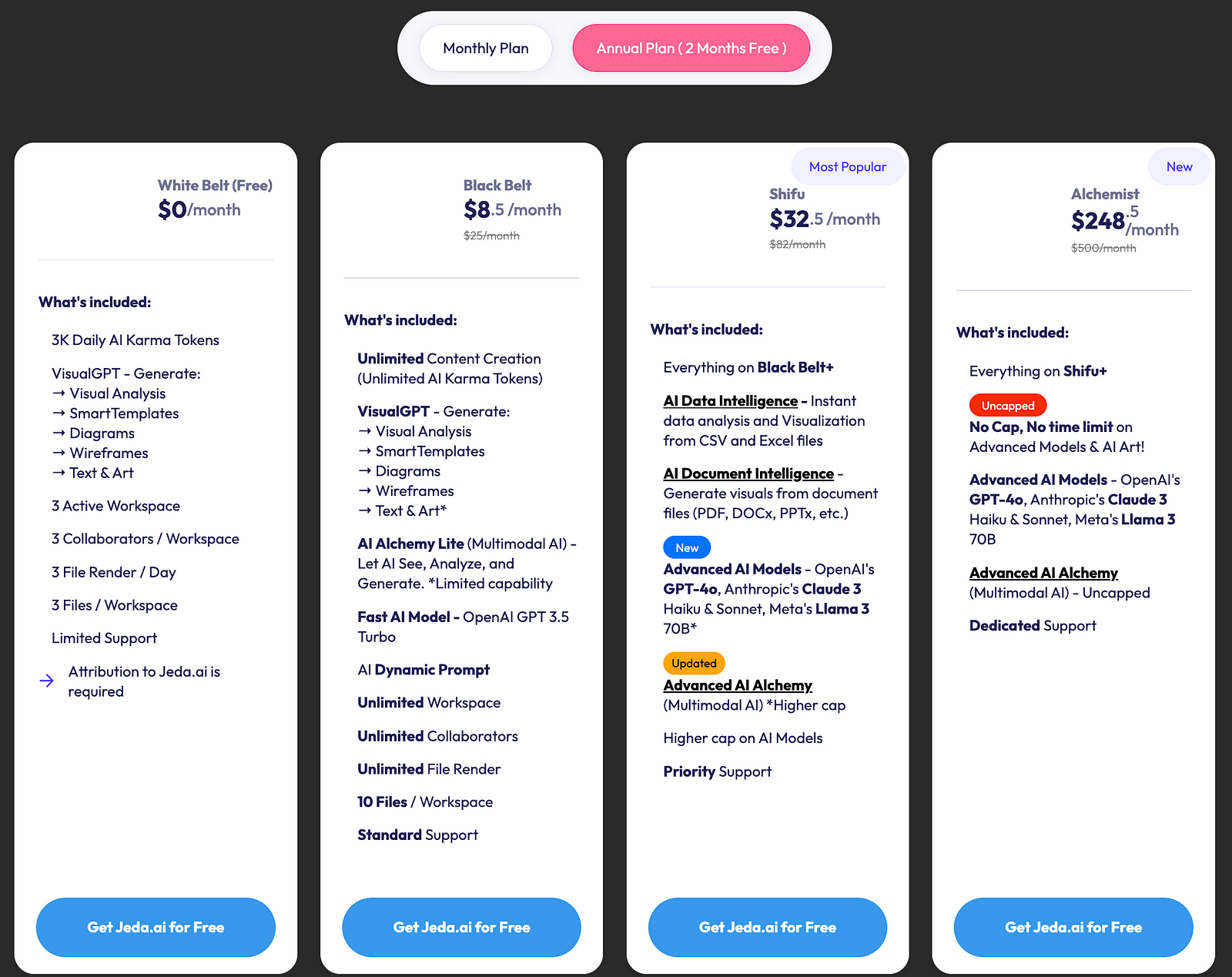
2 Ideamap
Ideamap offers a comprehensive suite of features for effective brainstorming. It offers features such as an intuitive interface, real-time collaboration, task management, and visual organization. The platform is designed to cater to various teams, including marketing, product development, and customer support, facilitating efficient workflow and idea generation.
The pricing plans are as follows:
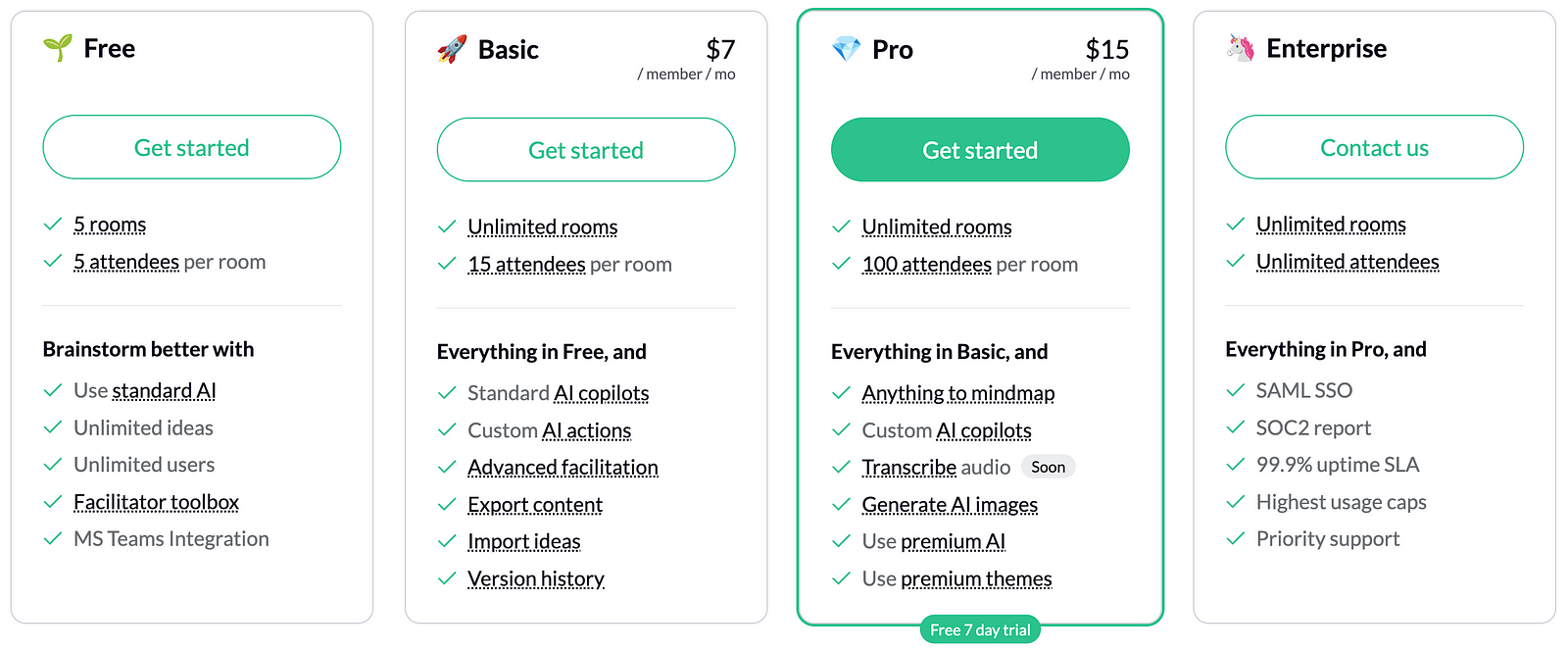
For Collaboration Notes
1 Mem
Mem features Mem Chat, an AI knowledge base that can retrieve specific information, summarize content, and draft unique material based on users’ notes. The app’s Related Notes feature clusters relevant content without manual organization, and AI Collections offer a simplified way to categorize notes without complex tagging or folder systems. Mem’s Smart Search utilizes AI to find notes quickly, going beyond simple keyword searches. The app also supports collaboration, quick searching, importing past notes, offline access, and real-time syncing, enhancing the note-taking experience across devices.
The pricing plans are as follows:
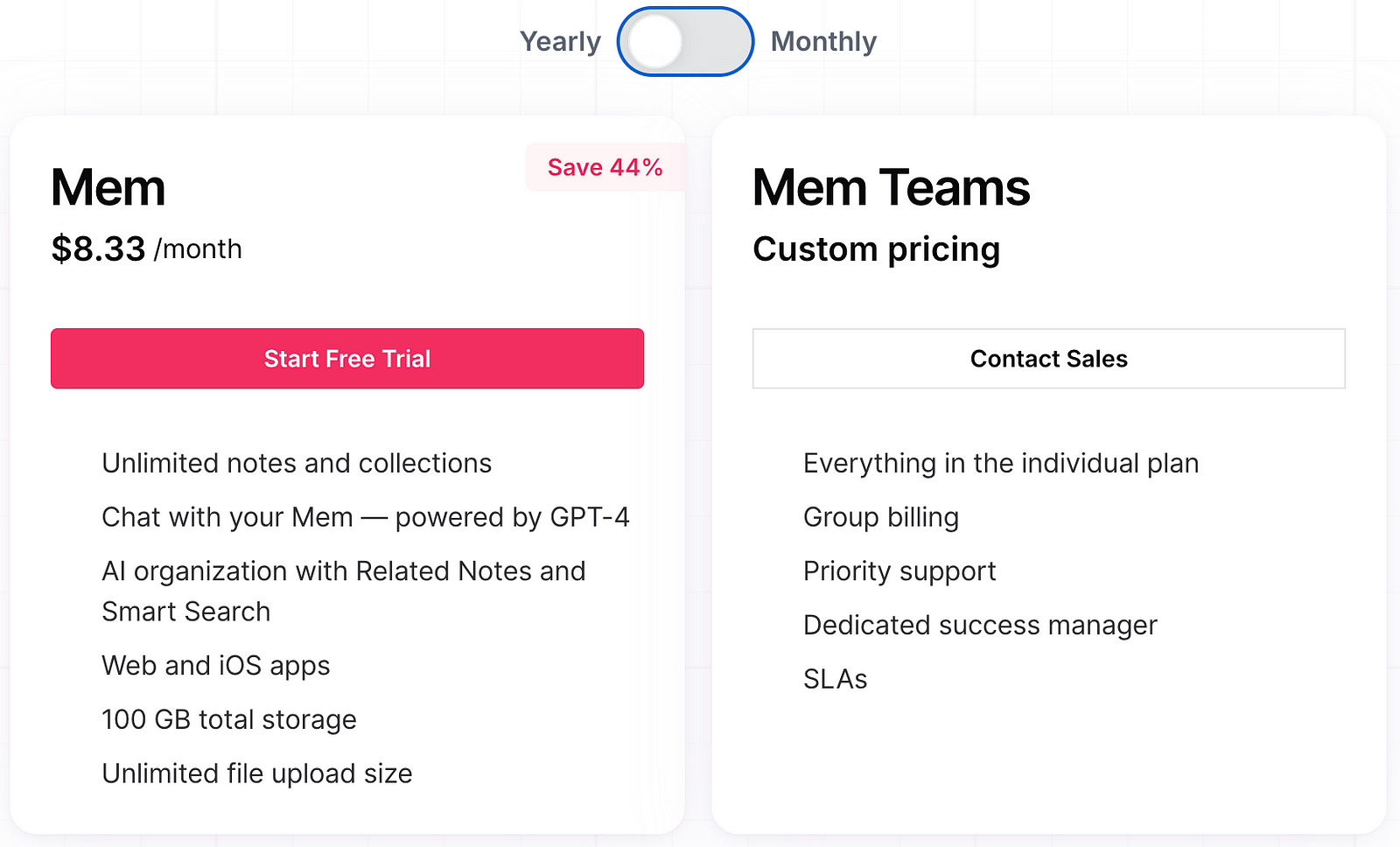
2 ClickUp
ClickUp is an all-in-one productivity platform designed to replace multiple work applications with a single, customizable solution that enhances collaboration, visibility, and automation for various teams.
The pricing plans are as follows:
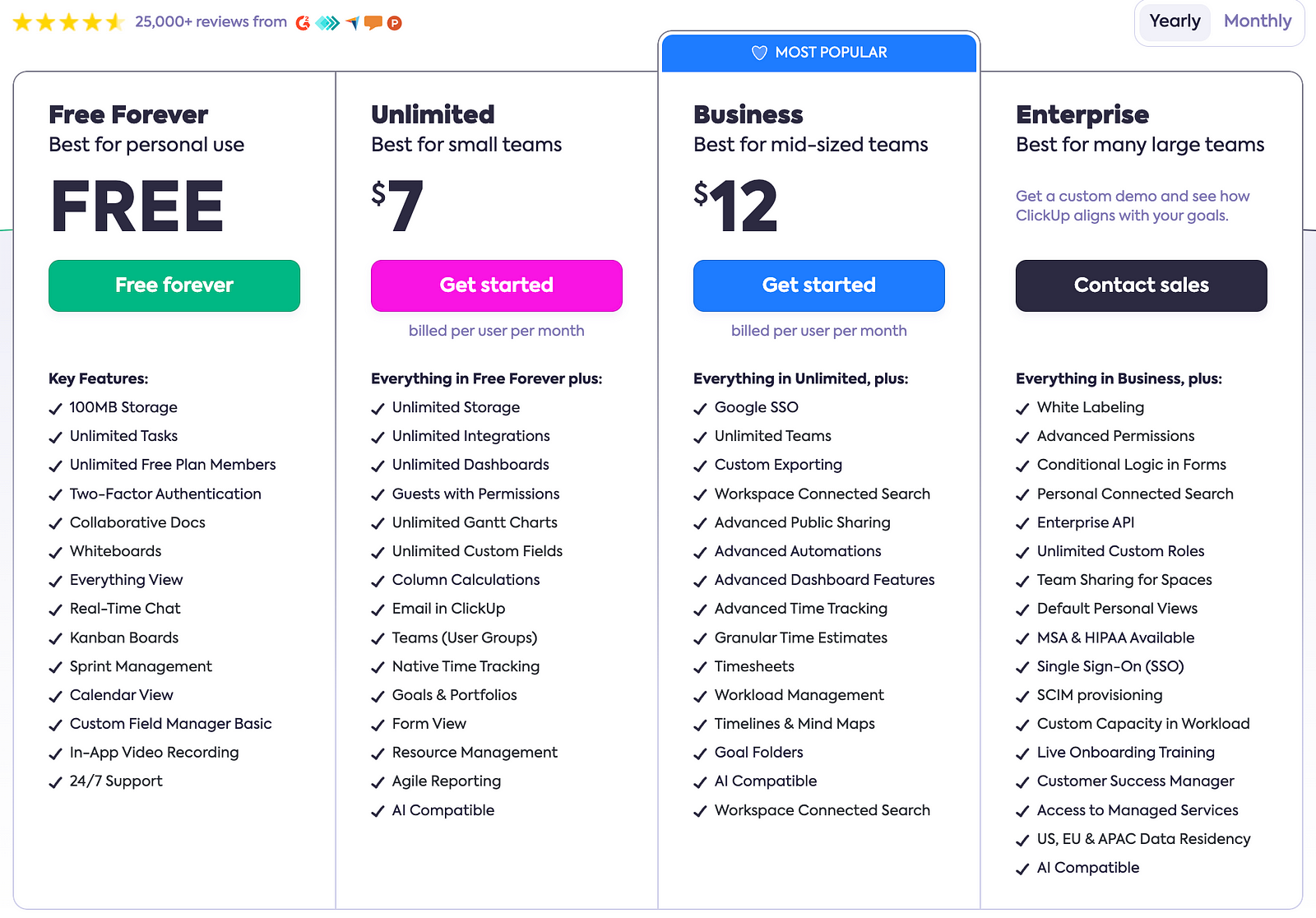
For Personal Notes
1 Evernote
Evernote positions itself as an indispensable tool for those looking to declutter their digital workspace. It promises to bring order to the chaos of information overload by offering features that allow users to capture, organize, and share notes from anywhere. The platform emphasizes its ability to cater to a variety of use cases, whether it’s for personal endeavors, professional projects, or collaborative efforts. With Evernote, users can tame the flood of notes, research, and to-do lists, ensuring that nothing falls through the cracks.
The pricing plans are as follows:
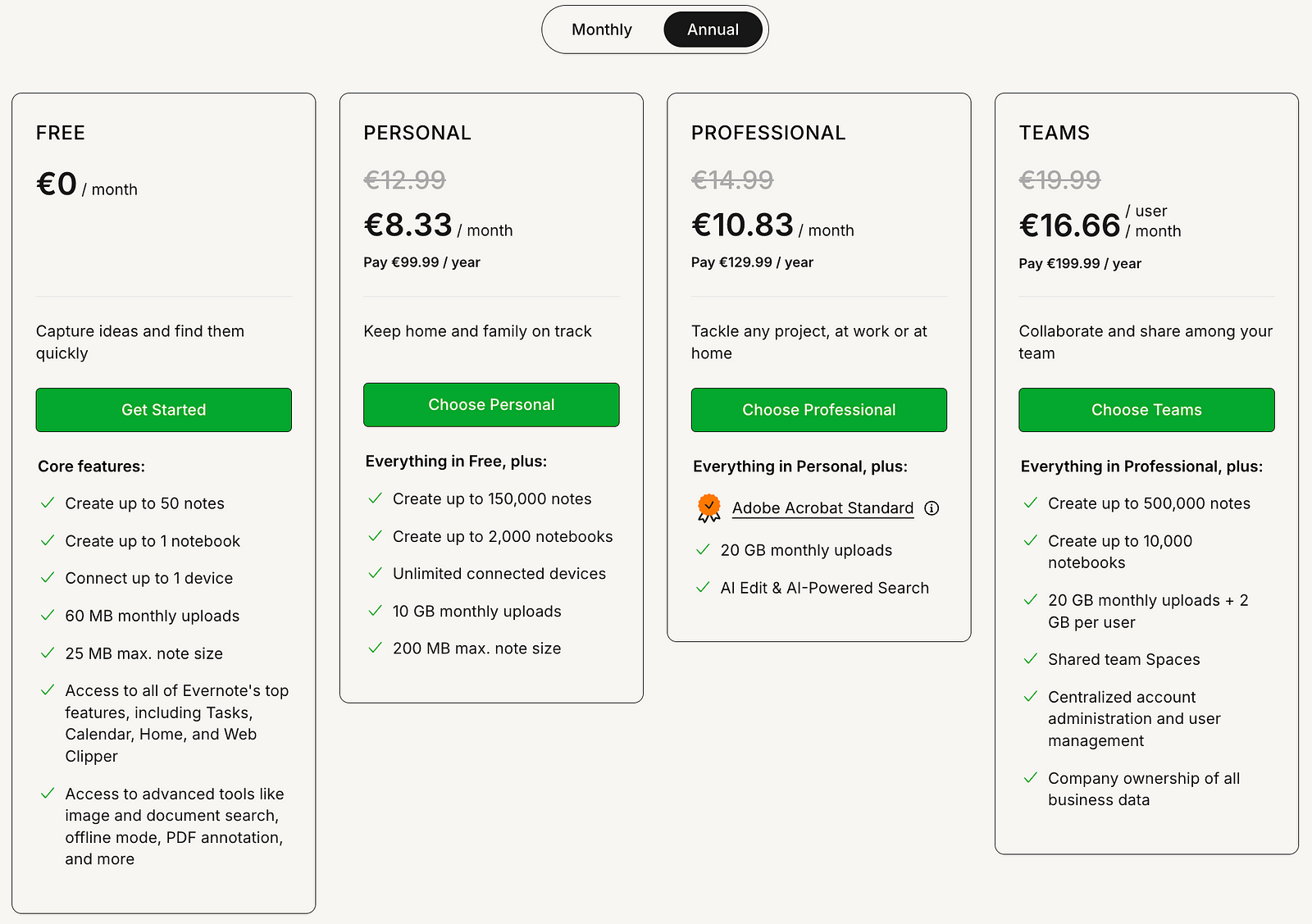
What Are the Factors to Consider When Building A Dynamic AI Notes App?
1. Type of AI Notes App
- Determine the specific needs your app will address. Is it more focused on transcription, summarization, organization, or a combination of these?
2. LLM API Integration
- The core of an AI notes app is its ability to understand and process human language. Therefore, you should consider integrating a Large Language Model (LLM) API.
- Novita AI provides developers with scalable and cost-effective LLM API. Our featured models are deployed for industry-leading speeds to excel at production tasks, and they enhance role-play, spark engaging discussions, and foster creativity, with content compatibility that is not subject to restrictions. You can try trendy models, e.g. meta-llama-llama-3.1–405b-instruct, for free on our LLM Playground.
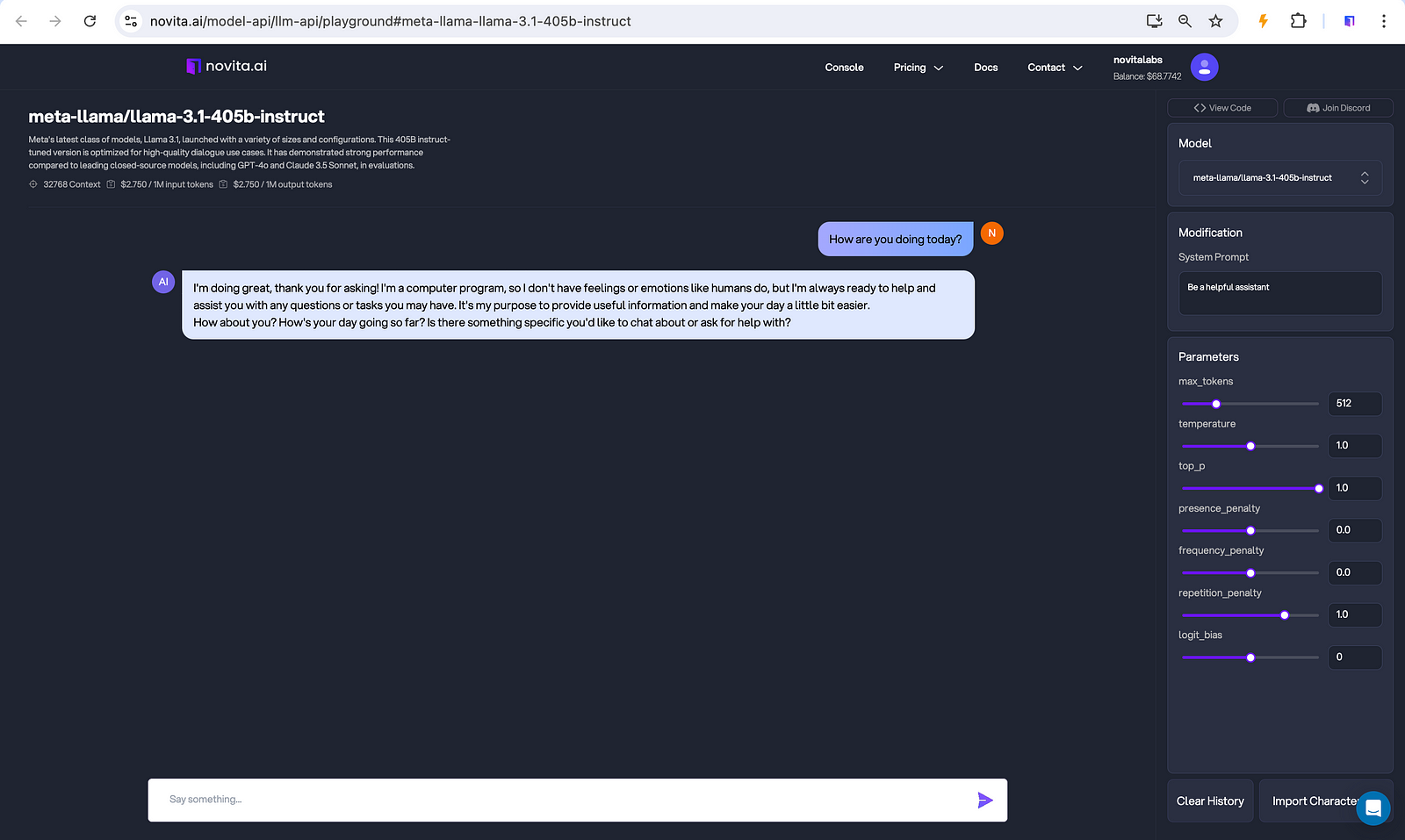
- This will enable advanced features like text generation, summarization, and contextual understanding.
3. GPU Instance Considerations
- For real-time processing and high-performance AI operations, GPU instances can be beneficial.
- However, for most note-taking apps, GPU instances may not be necessary if you’re using cloud-based LLM APIs.
- Consider GPU instances if you’re running your own models or require heavy local processing.
4. Data Storage and Retrieval
- Design an efficient database structure for storing notes, metadata, and AI-generated content.
- Implement fast retrieval mechanisms, possibly using vector databases for semantic search capabilities.
5. Real-time Collaboration Features
- Develop robust synchronization mechanisms for multi-user editing.
- Implement conflict resolution strategies for simultaneous edits.
6. User Interface and Experience
- Create an intuitive, responsive interface that seamlessly integrates AI features.
- Design for both desktop and mobile experiences.
7. Security and Privacy
- Implement end-to-end encryption for sensitive notes.
- Ensure compliance with data protection regulations (e.g., GDPR, CCPA).
- Provide user controls for AI data usage and storage.
8. AI-Powered Features
- Implement smart categorization and tagging of notes.
- Develop context-aware suggestions and auto-completion.
- Create summarization tools for long notes or multiple related notes.
9. Integration and API Development
- Build APIs for third-party integrations (e.g., project management tools, calendars).
- Consider webhook support for real-time updates across integrated platforms.
10. Legal and Ethical Considerations
- Be aware of the legal and ethical implications of AI, such as bias in AI algorithms and the use of user data for training purposes.
What Are the Future Trends of Dynamic AI Notes Apps?
According to Global Growth Insight report on note-taking app market, the future trends of dynamic AI-powered note-taking apps are expected to revolve around several key areas of innovation and user experience enhancement:
Advanced AI and ML Capabilities
AI and ML will continue to revolutionize note-taking apps by providing users with more intelligent insights, such as content summarization, sentiment analysis, and predictive text. These technologies will also enable more sophisticated voice-to-text features and natural language processing, making note-taking more efficient and intuitive.
Personalization and Customization
Future note-taking apps will likely offer greater personalization, adapting to individual user preferences and work styles. This could include customizable interfaces, AI-driven content recommendations, and smart categorization of notes based on user behavior.
Enhanced Collaboration Features
As remote work and team collaboration become more prevalent, dynamic AI notes apps will focus on real-time collaboration tools. Features like simultaneous editing, version control, and conflict resolution will become more sophisticated, facilitating seamless teamwork across different locations.
Cross-Platform Synchronization
The demand for cross-platform compatibility will drive the development of note-taking apps that offer seamless synchronization across a wide range of devices, ensuring that users have consistent access to their notes regardless of the platform they are using.
Security and Privacy Enhancements
With increasing concerns about data security, future note-taking apps will incorporate advanced encryption, multi-factor authentication, and other security protocols to protect user data from unauthorized access and breaches.
Integration with Other Tools and Services
Dynamic AI notes apps will offer deeper integration with other productivity tools, calendars, task managers and communication platforms, to streamline workflows and enhance productivity.
Voice and Natural Language Processing
The adoption of voice commands and natural language processing will allow users to interact with their note-taking apps in more natural and hands-free ways.
Handwriting Recognition
Advancements in handwriting recognition technology will make it easier for users to search, edit, and organize handwritten notes captured on touch-enabled devices.
Accessibility
There will be an increased emphasis on making note-taking apps more accessible to users with disabilities, incorporating features like screen reader compatibility and voice dictation.
Conclusion
Dynamic AI note-taking apps represent a significant advancement in the way users capture, organize, and utilize information. For developers, these apps offer a unique opportunity to innovate and cater to a market that is experiencing substantial growth. By incorporating features like real-time collaboration, advanced categorization, and personalized suggestions, developers can create tools that meet the diverse needs of students, professionals, researchers, and creatives. As the demand for intelligent note-taking solutions continues to rise, embracing the development of dynamic AI note-taking apps can position you at the cutting edge of this burgeoning field, driving efficiency and productivity for users across various scenarios.
FAQs
Are AI note takers good?
They are often more accurate than manual note-taking.
What is the best AI note recorder?
Top AI note recorders include: Otter.ai, Rev, Salesken.ai and tl;dv.
What is the AI tool for handwritten notes?
Tools like Handwrytten may be the one you are looking for.
Novita AI is the All-in-one cloud platform that empowers your AI ambitions. Integrated APIs, serverless, GPU Instance — the cost-effective tools you need. Eliminate infrastructure, start free, and make your AI vision a reality.
Recommended Reading
2024 Youtube Video Notes Taker AI Market and Leading Players
6 Best AI Chatbot for Ecommerce Success